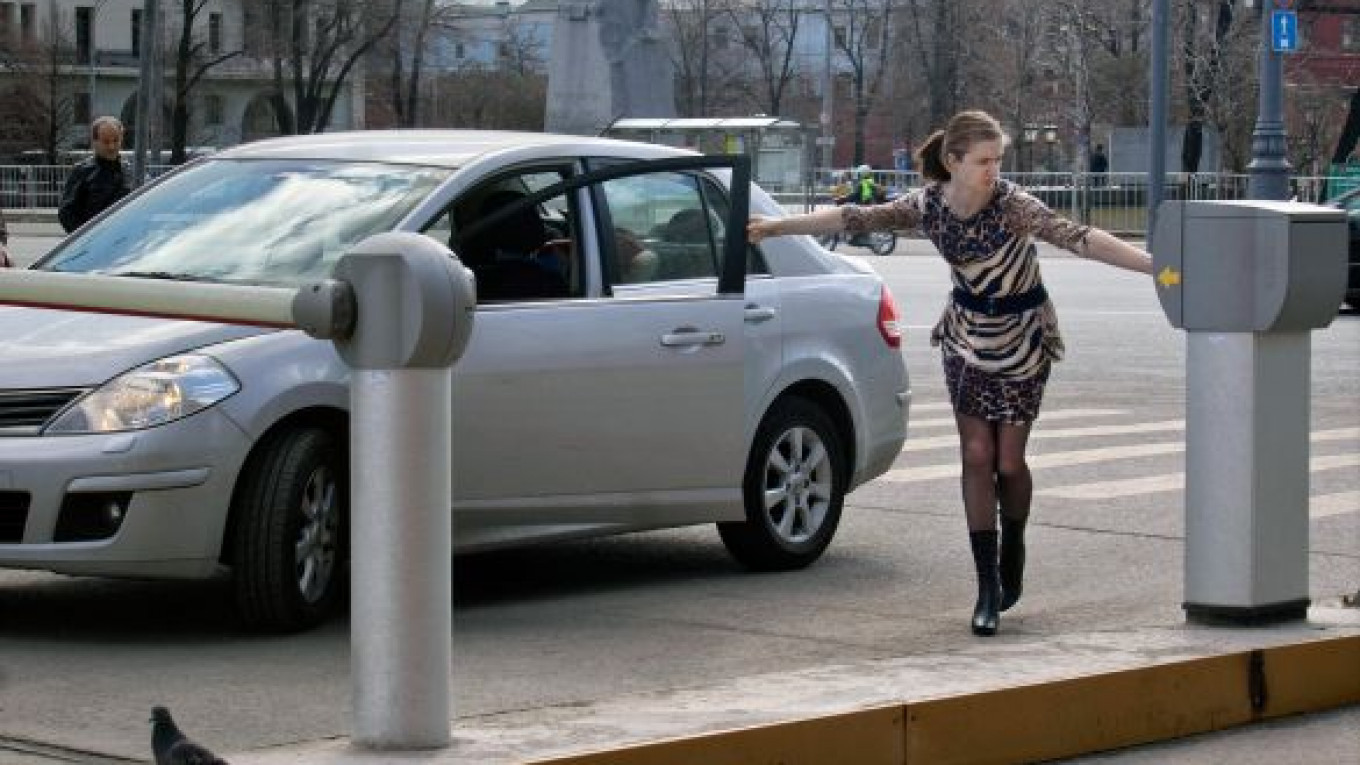Declaring its experiment successful, City Hall is expanding paid parking areas in Moscow out to the Garden Ring, while raising hourly fees, Deputy Mayor Maxim Liksutov said Wednesday.
Starting from Dec. 5, paid parking will be introduced in the Yakimanka and Zamoskvorechye districts in southern central Moscow. By Dec. 25 the remaining areas within the Garden Ring road will also be included.
Currently, paid parking exists only inside the smallest of the capital's central beltways — the Boulevard Ring — and it costs 50 rubles ($1.5) per hour to park there.
As the new areas are added, the parking charge will go up to 80 rubles ($2.5) per hour within the Boulevard Ring and to 60 rubles per hour inside the Garden Ring.
By comparison, drivers are charged $3.5 per hour to park in the heart of New York city.
Raising fees is an attempt to free up some parking space, the authorities said, as paid parking spaces in the center have become overly popular since their introduction a year ago.
"When this initiative had just started, parking spaces were on average 60 to 65 percent full but now some zones are 100 percent occupied," Liksutov said. "Our goal is to ensure that 20 percent of parking spots are empty in the center so the problem of cars searching for a space to park, which also adds to congestion, is removed."
After parking the driver has 15 minutes to pay the fee or face a fine of 2,500 rubles. Drivers who have struggled to find payment points or pay using their mobile phones have complained, but Liksutov defended the system.
While the convenience of paying for parking may still be questionable, most transportation analysts support the principle.
Other parties also see advantages in the scheme.
"High-end restaurants located in the city center may benefit from the measure as they have problems with parking, though it will not have a major impact on their revenues," said Yulia Stolnaya, a spokesperson for Planet Hospitality, a restaurant company that manages such brands as Sbarro and Yolki Palki.
Many Moscow residents also support the measure. A recent poll conducted by the Public Opinion Research Center found that 45 percent of Muscovites viewed the introduction of paid parking in the city positively, while 28 percent were against the measure.
The average driving speed within the Boulevard Ring increased by 9 percent since paid parking was introduced, Liksutov said, and the number of cars entering the center has fallen by a quarter. Added to that, the average time spent by cars in parking spaces has decreased from more than 6 hours to 1 hour and 20 minutes, he said.
While paid parking helps to reduce congestion, the fees also channel hefty amounts of money for the city budget.
In one year, the scheme has earned more than 150 million rubles ($4.7 million) for the Moscow budget. City Hall plans to distribute the money to municipal budgets in the areas where the money is collected, Liksutov said.
"The authorities in those districts where paid parking is introduced will be able to spend the funds on improving living conditions: by renovating buildings, creating green zones and, if necessary, clearing more parking space," the deputy mayor said.
The city currently oversees 36,644 parking spaces across the capital, including curbside parking, suburban car parks and paid parking areas.
Contact the author at a.panin@imedia.ru
A Message from The Moscow Times:
Dear readers,
We are facing unprecedented challenges. Russia's Prosecutor General's Office has designated The Moscow Times as an "undesirable" organization, criminalizing our work and putting our staff at risk of prosecution. This follows our earlier unjust labeling as a "foreign agent."
These actions are direct attempts to silence independent journalism in Russia. The authorities claim our work "discredits the decisions of the Russian leadership." We see things differently: we strive to provide accurate, unbiased reporting on Russia.
We, the journalists of The Moscow Times, refuse to be silenced. But to continue our work, we need your help.
Your support, no matter how small, makes a world of difference. If you can, please support us monthly starting from just $2. It's quick to set up, and every contribution makes a significant impact.
By supporting The Moscow Times, you're defending open, independent journalism in the face of repression. Thank you for standing with us.
Remind me later.






